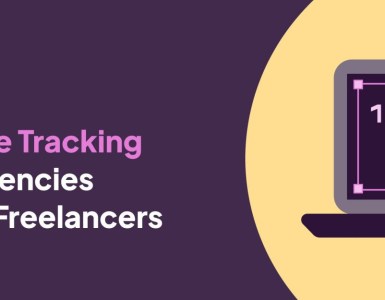
What truly makes an effective freelance management system?
Well, when you’re not used to it, managing freelancers can feel like a bit of a dark art. How do you know when they’re actually working? What if you hate the finished project?
To help you out, we’ve brought together the greatest expert minds in freelance management, to share their top 25 tips and tricks. Before you know it, you’ll have your freelance management system running like a well-oiled machine!
25 Top Tips on An Effective Freelance Management System
1.
I’ve seen many entrepreneurs who are managing freelancers poorly due to stupid miscommunication. There are two simple ways to avoid this.
The first is clarity – you need to make it extremely clear what you need doing, when you’re going to pay and when you need it done by. To do this, you need to understand yourself and your needs so you can communicate that effectively.
— John Rampton
Serial entrepreneur, online marketing guru and startup addict
——————–
2.
Once you’ve identified several freelancers that possess the skills you need, look at their portfolios closely.
Most importantly, what’s their track record like? How long have they been on the site? What is their rating? How much money have they collected? Have any of their clients hired them more than once? If they have repeat business, that’s a great sign.
— Stephen Key
Co-Founder of inventRight; Author of One Simple Idea Series
——————–
3.
Keep your e-mail messages short. If you have a lot of business to discuss, don’t put it all in one e-mail. Instead, send a list of things you need to discuss and highlight the ones that can be handled by e-mail. Request a short phone call for the rest.
— Allen Taylor
——————–
4.
For freelance management, take care to be transparent about the potential for future work. If a freelancer does well and there is more work to be done, they’ll be enthusiastic about the chance for consistent opportunity. Freelancers will be reliable if you are reliable.
— Corry Cummings
——————–
5.
Requiring your freelancer workforce to create daily or weekly reports can also make you more aware of the progress of the project. From time to time, do an update on your goals and provide feedback to motivate your freelancers to do better. You can also encourage participation by asking for their opinions once in a while.
— Dumb Little Man
——————–
6.
Be your own freelance project manager, and communicate email expectations to your freelancer in advance.
Do you expect a response outside of business hours? Do you prefer a summary email of all questions at the end of the day? Or are you open to questions coming in as they arise? Also, does your freelancer have particular hours that they are available for email? Take the mystery out of email frequency and time; it will do you both good.
— Anne Loehr
Generational Guru, Author & Transformational Leader
——————–
7.
Whatever you do, please don’t ask your freelancer to do speculative work or to complete a project for free with the promise of more work later. It’s disrespectful of the freelancer’s time. If you can’t afford to test the freelancer with a project and if the freelancer’s portfolio and references are not giving you confidence, it’s best to move on leaving everyone with dignity intact.
— Devon Campbell
Founder of RadWorks
——————–
8.
Project management for freelancers isn’t about just setting a task and being done with it. The best working relationships are between people who have some notion of one another – not just a faceless drone in another time zone you’ve never met and think you never need to speak with.
— Caitlin Kelly
Author of “Malled: My Unintentional Career in Retail“, speaker and New York Times contributor
——————–
9.
Freelancers are not employees; they are independent consultants who can work wherever and whenever they want.
Your best bet as a small business owner is to own your freelance management system – communicate effectively and set consistent deadlines. Attempt to outline the rules of your freelance relationship ahead of time through legal documents, and invest in freelance management software that may help with communication.
— John Boitnott
Journalist and digital consultant
——————–
10.
Assume nothing and leave nothing to the imagination because left to personal interpretation, the project can easily go off course.
— Tan Guan Hao
——————–
11.
Freelancers thrive on open communication, with direction, and when their content managers and editors give them feedback and company information that informs the content they’re helping create.
Yes, they appreciate freedom and creativity, but they also welcome constructive feedback and notes from their clients that make the task at hand more clear.
As with any business partnership, it’s important that both parties be open and honest about what they need. As long as this is happening, they can produce incredible, valuable content together.
— Kaleigh Moore
Marketing Insider Group
——————–
12.
The rules and regulations apply to everyone, and that means they apply to you too.
So, spend time reading, researching and understanding what the law is asking you to do. In this way, you’ll set the right ground rules with your freelance staff from day 1 and avoid any legal landmines over the course of business.
— Vivek Gopalpuria
Associate Director of Product Marketing at Replicon
——————–
13.
It’s counterproductive not to monitor them (freelancers) so that you can support and adjust. While holding high standards on the value I expect from freelancers, I find that I get even more value from them if I’m aware of their progress.
— Robert McGuire
Content marketing consultant, writer and managing editor at McGuire Editorial
——————–
14.
Stepping up to actively collaborate with and manage freelancers is less time-consuming and expensive than serial hiring that gives you a reputation for being demanding and difficult.
— Kyla Roma
Marketing and profitability strategist
——————–
15.
Freelancers work best when they have deadlines. ‘Just get it to me as soon as you can‘ is not a deadline, and the freelancers will flounder.”
— Neil Patel
Entrepreneur, investor & influencer
——————–
16.
When interviewing freelancers, discuss your needs as well as theirs to determine if the relationship will work. A freelance management system work best when there’s balance and cohesion. Any relationship is a two way street – both of you have needs and they must be put on the table. You’ll also want to discuss expectations on both sides.
— Michelle Adams
Vice President of Gordon Training International
——————–
17.
You should regularly check in with your freelancer to ensure that the parameters agreed to still work. Depending on the development cycle for the project you may need to adjust your plans above. Keep the process fluid so you’re not locked into one modality for the duration of the engagement.
— Rishon Blumberg
Co-founder of 10x Management
——————–
18.
Don’t think just because the contractor is work-for-hire that you should take advantage. They deserve to be treated fairly. Even if you’d like to test the person out before committing to a big project with them, avoid asking for work on spec; offer to pay for the time. You don’t want to risk getting a bad reputation.
— Amy Gallo
Writer, speaker and contributing editor at Harvard Business Review.
——————–
19.
Process payments as quickly as you possibly can. Stay on top of accounts payable and make sure your company expedites payments to your freelancers right after the work has been delivered.
Paying freelancers on time is very different from paying larger vendors. Your on-time payment can mean your freelancer’s ability to pay his or her rent on time. With a freelance management system, this is often one of the simplest things you can do that makes the biggest difference for freelancers.
— Nataly Kelly
VP of International Operations and Strategy at Hubspot.
——————–
20.
The importance of developing a concrete budget cannot be understated. Your budget will, to an extent, determine the quality of work you receive. Don’t assume that you can make a low-ball offer and get high-quality work in return.
— Anna Johansson
Freelance writer, researcher, and business consultant
——————–
21.
Overcommunicate, don’t wait till the end of a project to discover you weren’t on the right path. Always keep asking questions and keep making sure that everyone is on the same page. Clearly state deadlines and review and communicate. You always want to be anticipating problems instead of reacting to problems for a successful project together.
— Gail Johnson
Award-winning journalist
——————–
22.
If having your freelancer perform web design at the local pub or at the beach does not sit well with you, freelancers may not be a good fit. Consider whether your company needs to exert such direct control, or whether a firm deadline with specific deliverables and quality standards will be enough to get the quality results you require.
–Danielle Urban
Partner at Employment Law Specialists Fisher Phillips
——————–
23.
I like to chat online with freelancers for a bit before hiring them to see if our communication style is similar and to judge response time and skills.
I highly recommend this before hiring anyone.
— Lesley Pyle
Founder and President at HomeBasedWorkingMoms and HireMyMom
——————–
24.
It’s really important to do your homework when vetting an individual, and vetting an individual goes so much beyond just their portfolio.
— Jared Lindzon
Freelance journalist
——————–
25.
If you’re not actively managing your freelancers your business is missing out.
— Karen Sargeant
Freelance Operations Manager and Business Coach
Want to learn more about working with freelancers? Download our free ebook.
Ready to hire? Our marketplace of over 410,000 freelancers have the skills and expertise needed to skyrocket your business, today.







